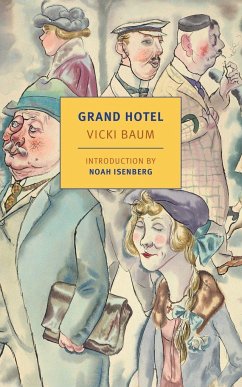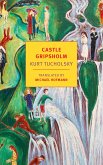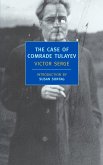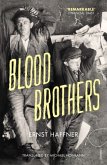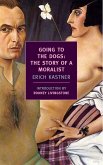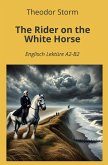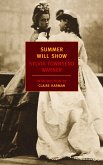A luxury hotel in 1920s Berlin is a microcosm of modern society in this classic that inspired a hit Broadway musical and the classic film starring Greta Garbo, Joan Crawford, and John Barrymore.
Prefigures Downtown Abbey and Upstairs, Downstairs by examining multiple characters from different classes. Shelf Awareness
The luxury Grand Hotel is a revolving door for the stray souls of 1920s Berlin. Among the guests is Doctor Otternschlag, a World War I veteran whose face has been sliced in half by a shell. Day after day he emerges to read the paper in the lobby, discreetly inquiring at the desk if the letter he s been awaiting for years has arrived. Then there is Grusinskaya, a great ballerina now fighting a losing battle not so much against age as against her fear of it, who may or may not be made for Gaigern, a sleek professional thief. Herr Preysing also checks in, the director of a family firm that isn t as flourishing as it appears, who would never imagine that Kringelein, his underling, a timorous petty clerk he s bullied for years, has also come to Berlin, determined to live at last now that he s received a medical death sentence.
All these characters and more, with all their secrets and aspirations, come together and come alive in the pages of Baum s delicious and disturbing masterpiece a Weimar-era bestseller that retains all its verve and luster today.
Hinweis: Dieser Artikel kann nur an eine deutsche Lieferadresse ausgeliefert werden.
Prefigures Downtown Abbey and Upstairs, Downstairs by examining multiple characters from different classes. Shelf Awareness
The luxury Grand Hotel is a revolving door for the stray souls of 1920s Berlin. Among the guests is Doctor Otternschlag, a World War I veteran whose face has been sliced in half by a shell. Day after day he emerges to read the paper in the lobby, discreetly inquiring at the desk if the letter he s been awaiting for years has arrived. Then there is Grusinskaya, a great ballerina now fighting a losing battle not so much against age as against her fear of it, who may or may not be made for Gaigern, a sleek professional thief. Herr Preysing also checks in, the director of a family firm that isn t as flourishing as it appears, who would never imagine that Kringelein, his underling, a timorous petty clerk he s bullied for years, has also come to Berlin, determined to live at last now that he s received a medical death sentence.
All these characters and more, with all their secrets and aspirations, come together and come alive in the pages of Baum s delicious and disturbing masterpiece a Weimar-era bestseller that retains all its verve and luster today.
Hinweis: Dieser Artikel kann nur an eine deutsche Lieferadresse ausgeliefert werden.
"The legacy of Baum's novel is not just the 1932 MGM film starring John Barrymore and Greta Garbo (and the 1980s Broadway musical), but all those star-stuffed movies and fat popular novels...in which some institution or event serves as the setting for the intersecting individual dramas. What distinguishes the book from its plump progeny is not only its relatively modest length but the delicacy of Baum's writing...The book is kin to both the stories of Stefan Zweig and the films of Max Ophüls, both artists who chronicled devastating loss but drew our eye to the exquisite fluidity with which the most precious things slid through their characters' elegant, manicured fingers.
Kirkus starred review
Through the revolving doors of Grand Hotel pass multifarious stray souls: some resigned to their drab fates, others searching eagerly for life all persuaded that it has somehow passed them by. We meet them as they come under the practiced eye of the staff, expert in Weimar Berlin s taxonomies of class. Like George Grosz, Vicki Baum renders human foibles at their most pathetic, despicable, and comical, then turns her characters inside out, until we recognize our own hopes and fears refracted in them.
Holly Brubach
The author's strength is creating compelling characters with sexual attitudes that feel contemporary. Grand Hotel prefigures Downtown Abbey and Upstairs, Downstairs by examining multiple characters from different classes (both guests and the hotel staff) in a single-setting microcosm of society and lives up to its reputation as a modern classic.
Kevin Howell, Shelf Awareness
A spiritual motion picture of modern life, the characteristics, the cross-currents of thought and emotion, of this new age.
J. B. Priestley
[Told] with unusual skill and distinguished by an acute perception of minor detail.
George Dangerfield, The Bookman
One of the most perfectly constructed popular novels in modern literature.
Frank N. Magill, editor of Masterplots, Revised Edition
Kirkus starred review
Through the revolving doors of Grand Hotel pass multifarious stray souls: some resigned to their drab fates, others searching eagerly for life all persuaded that it has somehow passed them by. We meet them as they come under the practiced eye of the staff, expert in Weimar Berlin s taxonomies of class. Like George Grosz, Vicki Baum renders human foibles at their most pathetic, despicable, and comical, then turns her characters inside out, until we recognize our own hopes and fears refracted in them.
Holly Brubach
The author's strength is creating compelling characters with sexual attitudes that feel contemporary. Grand Hotel prefigures Downtown Abbey and Upstairs, Downstairs by examining multiple characters from different classes (both guests and the hotel staff) in a single-setting microcosm of society and lives up to its reputation as a modern classic.
Kevin Howell, Shelf Awareness
A spiritual motion picture of modern life, the characteristics, the cross-currents of thought and emotion, of this new age.
J. B. Priestley
[Told] with unusual skill and distinguished by an acute perception of minor detail.
George Dangerfield, The Bookman
One of the most perfectly constructed popular novels in modern literature.
Frank N. Magill, editor of Masterplots, Revised Edition

